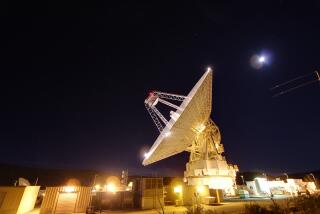Study Needed to Cut Health Risk in Space, Panel Warns
- Share via
WASHINGTON — Before carrying out President Bush’s proposal for a base on the Moon and a manned mission to Mars, the space agency needs to study new technologies and eliminate “unacceptable risks to the crew,” the National Research Council said Friday.
In a report requested by Vice President Dan Quayle, chairman of the National Space Council, the research group said that the exploration plan by the National Aeronautics and Space Administration “addresses a reasonable set of technological and strategic approaches, but not all of the technically credible approaches have been analyzed.”
The research council, an arm of the congressionally chartered National Academy of Sciences, also said:
--Operation of a U.S. space station by the late 1990s as scheduled is a “reasonable assumption” but present plans for the station are not adequate for a Moon-Mars mission. The station “may not be the most appropriate staging base for the Moon and Mars,” or two stations may be needed.
--Nuclear power “eventually will be essential” for the Moon and Mars bases. Also, nuclear propulsion of spacecraft, included by NASA as an option, should be tested. “The use of nuclear technology in space faces formidable barriers of public acceptance, however, especially if employed in Earth orbit. Therefore, issues of safety are paramount in research and development.”
--Although the NASA proposals envision bases on Mars, “it appears that a station in Mars orbit requires a less demanding infrastructure than a surface base and might serve a useful purpose in the early stages of human space exploration.”
--Possibilities for international cooperation should be explored because breakthroughs have been made in Europe, Japan and elsewhere and, “most importantly, the Soviet Union has substantial relevant capability, demonstrated continued interest in Mars, and an apparent strong desire for cooperation with the United States in Mars exploration.”
The council’s study, made by a 14-member committee named in January, said it was vital to the Moon-Mars mission that the United States have “the capability to send humans into space, maintain them in a physical condition that permits them to work productively and return them to Earth in good health.”
More to Read
Sign up for Essential California
The most important California stories and recommendations in your inbox every morning.
You may occasionally receive promotional content from the Los Angeles Times.










